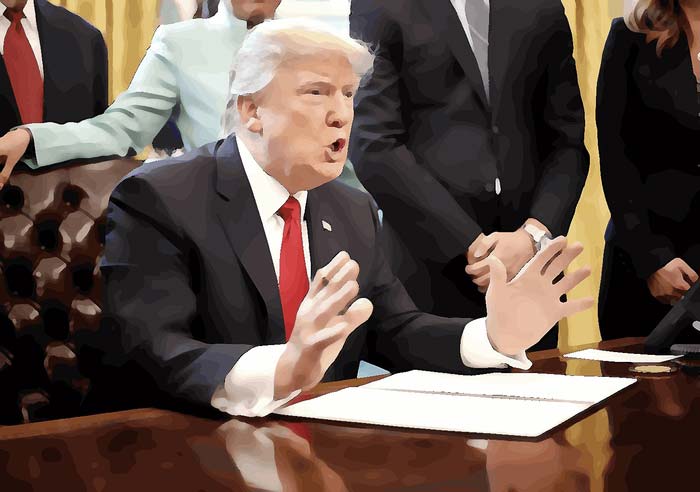
The demise of the Republicans' long-awaited, much-vaunted attempt to repeal and replace Obamacare has been widely described as a devastating opening defeat for President Donald Trump and GOP leaders in Congress.
It was.
But it was so much more.
Coming one day after the troubled plan's seventh anniversary, the legislative retreat appeared to be a major victory for minority House Democrats, but really, they did absolutely nothing to bring it about.
What the failure really showed is that the GOP's current political dominance in Washington might not last long.
Beginning in 2010, the House of Representatives staged dozens of symbolic Obamacare repeal votes, which it knew full well were futile as long as what's-his-name had his feet up on the Oval Office desk.
All that only to see last week's effort torpedoed by a rump pack of Republicans who've shown a keen interest in policy-strutting but none in the actual teamwork of governing.
It's worse than embarrassing. After seven long years of Obamacare opposition, Republicans couldn't agree on what to repeal and what to substitute. Seriously?
As candidates, everyone from Trump down to the smallest-minded GOP House member made repeal and replace the premier political promise of 2016. Trump, with characteristic emphasis, personally promised it would be, "Immediate. Immediate!"
He made an earnest effort to herd sufficient House Republicans behind the measure, working the phones most evenings until near midnight, even visiting Capitol Hill. There, the president, who won't face voters again for nearly four years, if ever, warned members that many could lose their jobs 84 weeks from now in the 2018 midterms if they repealed their repeal promise.
Historically, the party controlling the White House does suffer losses in off years. Members of the GOP's so-called Freedom Caucus, the tiny conservative cadre that sank this repeal, may well find the undesirable freedom to seek other employment next year.
It's ironic the Freedom Caucus is the political descendant of the grass-roots tea party, spawned in 2010 over conservative opposition to Democrats' ramming Obamacare through with not a single GOP vote. Now that same crowd is stained with large responsibility for the repeal's defeat.
"We were all for repeal, just not that repeal" is a sales pitch that won't fly with angry folks in flyover country who've perceived betrayal after betrayal from representatives whose calls for money and votes they dutifully delivered time after time since the rebellion ignited seven years ago.
Don't forget: The staunch, newly composed voter base that handed that stunning upset win to Trump is viscerally unhappy with Washington elites on all sides. Trump was their non-ideological champion, the new sheriff who would shake things up.
In that sense, the media's ongoing gleeful depiction of the repeal failure as a rude rebuff to rookie Trump actually helps him in an unexpected way, as their overwhelmingly negative campaign coverage did last year. It confirms deliciously how much Trump is roiling the hated D.C. establishment and how hard he honestly tried in this case to steer Congress, whose approval wallows in the teens.
Notice how late last week Trump, in effect, said: That's it -- We're done negotiating with recalcitrant House Republicans. As he wrote in "The Art of the Deal" 30 years ago, a crucial bargaining tactic is the willingness to walk away from any deal, something, for instance, Obama was incapable of during his Iran nuclear talks.
Notice too how quickly this businessman moved on to the next agenda item. Within minutes of abandoning the repeal effort, Trump was talking tax overhaul as a job-creating economic stimulus. "We are going, right now, for tax reform," he said.
But as we saw with the repeal effort, Trump's adopted party is riven with feuding factions, and those divisions are pronounced over the key border tax on imports.
Two months ago, it seemed the Grand Old Party -- with control of Congress and most state governments, and its 19th president in the White House -- was poised for an era of historic success, if only it could avoid its own too-familiar circular firing squads.
It would be an historic irony then if the 45th president and congressional Republicans were ultimately stymied in their conservative agenda, not by aging operatives of an impotent, leaderless Democratic minority, but by their own shortsighted inability to deal with long-term success.
Andrew Malcolm
McClatchy Washington Bureau
(TNS)
Comment by clicking here.
Malcolm is an author and veteran national and foreign correspondent covering politics since the 1960s.


 Contact The Editor
Contact The Editor
 Articles By This Author
Articles By This Author